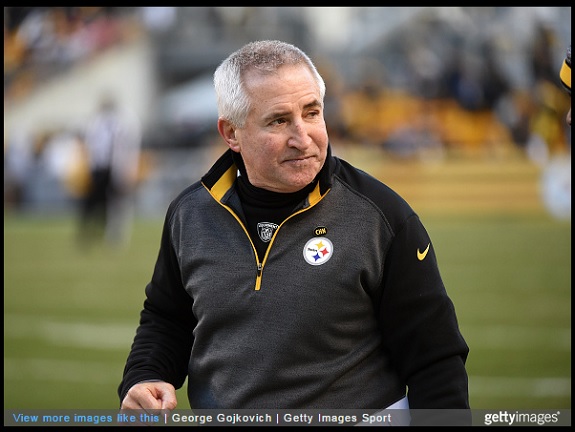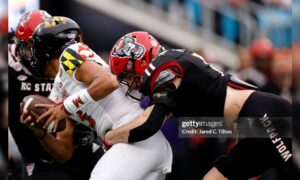In the world of coaching, it’s a rarity to be able to say you’re on a team that you grew up rooting for, and one that is near and dear to your heart. Although not as ballyhooed as an offensive or defensive coordinator is, a special teams coach is just as important, as the game of field position can easily be the difference in a win, loss or tie.
Such is the tale of Steelers’ special teams boss, Danny Smith, a Pittsburgh native who played his high school football at Pittsburgh Central Catholic. After playing defensive back at Edinboro State from 1971-75, he took a graduate assistant position here as well up until 1977.
Then, as fate would have it, his magical coaching carousel brought him back to a familiar place where he started, at Central Catholic. At PCC in 1977, Smith was one of two assistants who helped develop and mold Parade All-American quarterback Dan Marino, who had basically every major college in the country after him. He owned a rocket for a right arm, and Smith helped mold the youngster, who as we all know now resides in the Pro Football Hall Of Fame.
Following that were Clemson, The College of William & Mary, Georgia Tech and The Citadel before his NFL coaching opportunity finally came knocking in 1995, when he was hired as special teams/defensive backs coach. After stints with the Lions and Bills, Smith finally began making a name for himself when he was named special teams coordinator of the Redskins. In his second season there in 2005, Washington ranked near the top of the league in punt and kickoff coverage, and in 2006, not only was the coverage tight, but the splash plays were aplenty with return touchdowns, blocked punts and field goals.
As the unit’s success rose, so did Smith’s name. In fact, in 2010, the Steelers and Mike Tomlin were denied a request to interview Smith for the same position in Pittsburgh.
“In the NFL, there’s not a lot you can do about it when a team denies permission,” said Smith, according to Ray Fittipaldo of the Pittsburgh Post-Gazette. “It’s hard to fight those things because it’s good to be wanted and those type of things.”
However, fast forward to January 2013, after Amos Jones left Pittsburgh for the desert to run the special teams under Bruce Arians, and Tomlin came calling again. This time, he would not be denied, and I’m sure you can guess what Smith’s answer was. After 37 years of coaching stops littered all across the country, Smith finally was home.
“I get emotional talking about it because I haven’t lived here in a long time,” Smith said when he was hired, according to Fittipaldo. “Growing up here, the Steelers really stick with you. They really do.”
His expertise on special teams was evident even in his first season in Pittsburgh, as kicker Shaun Suisham connected on 30 of 32 field goals, and his 93.8 field goal percentage set a new single-season team record. It also marked Antonio Brown’s first trip to the Pro Bowl, as a returner and wide receiver. He had five returns of 40+ yards on the season, including his 67-yard touchdown in week 15 versus Cincinnati.
Now heading into 2015, he’s tasked with finding someone to take over for Brown’s duties since the likelihood of getting injured on special teams is much higher, considering the size of the players who have built up a 25 or 30-yard head of steam. Perhaps it’s Dri Archer, whose college highlights show off his blinding speed taking many kickoff and punt returns to paydirt. Either way, it’s way too risky placing an All-Pro with Brown’s immense talents at risk.
One thing is for certain, and that’s the fact that Smith is in a place he’d likely love to end his career in, and that’s the Steel City. And after all the years he’s put into his coaching career, what a better ending than to finally come home.
“When the opportunity came, I really wanted to do it,” he said, according to Fittipaldo. “That’s what’s so special about the Steelers because that’s how they operate, and that’s what I’m all about. I’m excited about the players I have here. We have good work ethic and great tradition. Those things make it easy to coach.”








